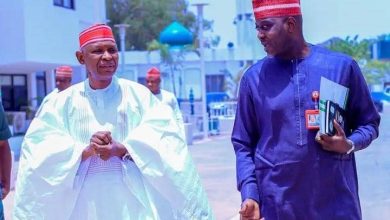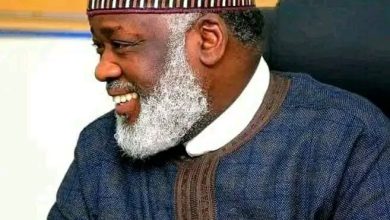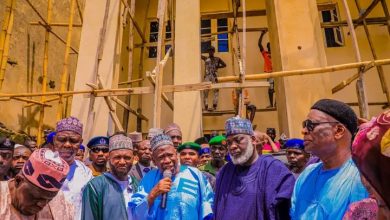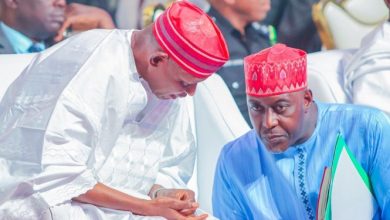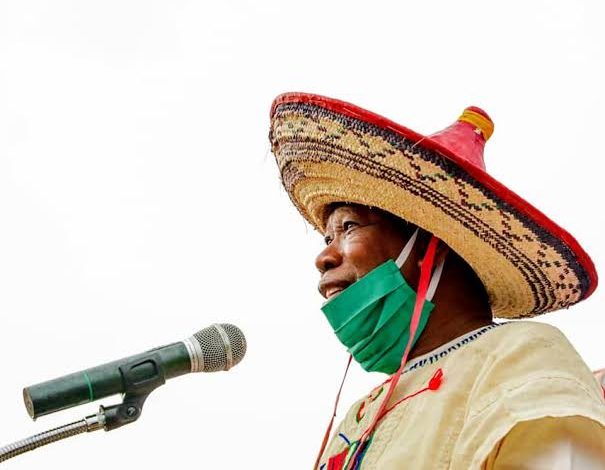
Dr. Abdullahi Umar Ganduje’s administration as Governor of Kano State (2015–2023) was defined by a series of rural-focused policies aimed at improving livelihoods in remote communities. These initiatives were tailored to address the needs of herders, farmers, and low-income populations who often suffer from limited access to infrastructure and basic amenities compared to the urban centers.
From road construction to veterinary services, Ganduje’s government executed several projects that touched the heart of rural Kano. His administration prioritized rural development as a key factor in addressing the root causes of migration, insecurity, and economic stagnation in the countryside.
Related:
Unlike Others, Ganduje Completed All Projects Before His Exit
One of the signature achievements was the establishment of 25 housing units for herders in Dansoshiya Forest, Kiru Local Government Area. The settlement included water facilities, a veterinary clinic, a school, and grazing reserves. The housing project, reportedly worth hundreds of millions of naira, was aimed at reducing the long-standing herder-farmer conflict and improving settlement patterns for nomadic populations. This was in addition to the annual cattle vaccination exercise popularly known as Huji, carried out throughout his administration to boost the herders’ economy and ensure healthy livestock for urban consumption.
In education, Ganduje constructed over 3,000 classrooms and rehabilitated hundreds more in rural areas between 2015 and 2021. According to the Kano State Ministry of Education’s 2021 report, about N17 billion was allocated to education in the 2020 budget, with a large portion directed toward primary and secondary schools in local governments across Kano State.
Read Also:
Why Kano APC Backs Ganduje, Declares Him ‘Undisputed Leader’ of the Party
The administration also paid attention to agricultural reforms. Through the Kano Agro-Pastoral Development Project (KSADP), funded by the Islamic Development Bank (IsDB) and the Lives and Livelihoods Fund (LLF), Ganduje initiated large-scale rural empowerment programs. These included artificial insemination training for 60 herder youths (an initiative later reported to have faced bureaucratic implementation issues) and the establishment of milk collection centers. The KSADP alone had an estimated budget of $95 million, directly targeting over 200,000 farmers and herders.
Road connectivity saw significant improvement. Rural roads linking agricultural zones to markets were constructed and some rehabilitated. For instance, feeder roads in Tudun Wada, Doguwa, and Gabasawa were part of the Rural Access and Agricultural Marketing Project (RAAMP), which had both federal and state joint funding. In 2019 alone, the state government allocated over N10 billion to rural infrastructure development.
The Ganduje-led government also introduced empowerment schemes such as the Women and Youth Empowerment Programme, which included training in local crafts and provision of startup capital, especially for residents of remote LGAs like Makoda, Kunchi, and Sumaila. Over 50,000 beneficiaries reportedly received direct support through these schemes between 2017 and 2022.
In health, primary healthcare centers in remote communities were rehabilitated and equipped, with the aim of achieving the Basic Healthcare Provision Fund (BHCPF) goals. The 2022 budget allocated over N5 billion to rural health services, including the upgrade of PHCs in Bebeji, Warawa, and Rogo LGAs.
Despite criticisms from opposition figures that some projects were politically motivated, performance indices drawn from state budget reviews, third-party audits, and community testimonies suggest tangible impacts.
Dr. Ganduje’s policies toward rural Kano were neither accidental nor cosmetic. They were grounded in the understanding that the economic backbone of the state resides in its hinterlands. By focusing on farmers, herders, and other rural dwellers, he left behind a model of development that, if sustained, could reshape the rural economy and reduce urban pressure.
While every administration has areas for improvement, Ganduje’s rural focus supported by data, budgetary commitments, and visible projects remains a defining chapter in Kano’s development history.
Umar is a political analyst and writes from Kano.
